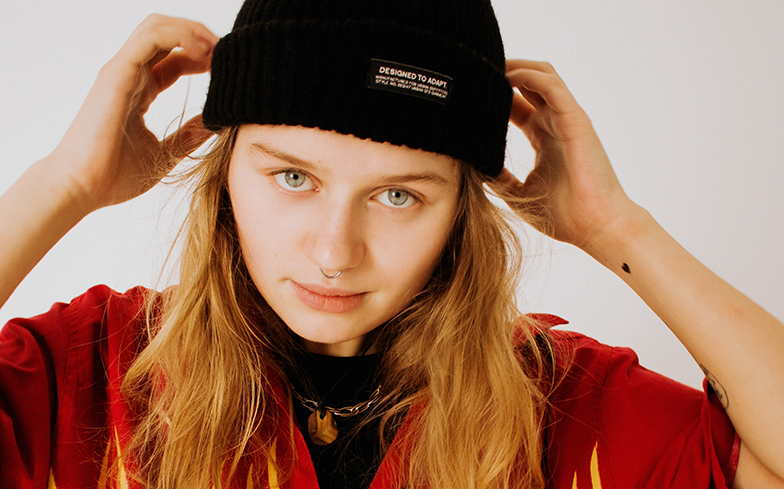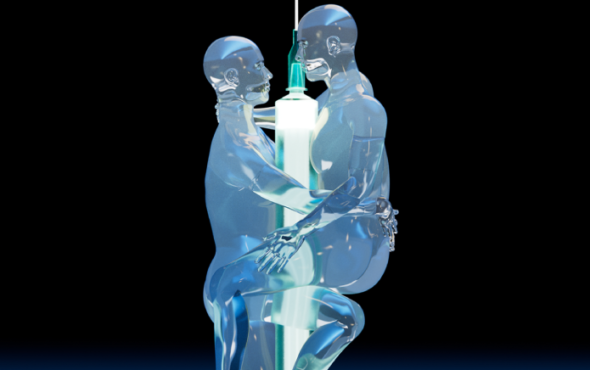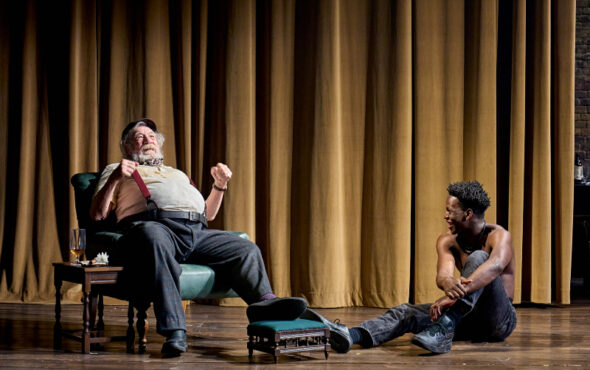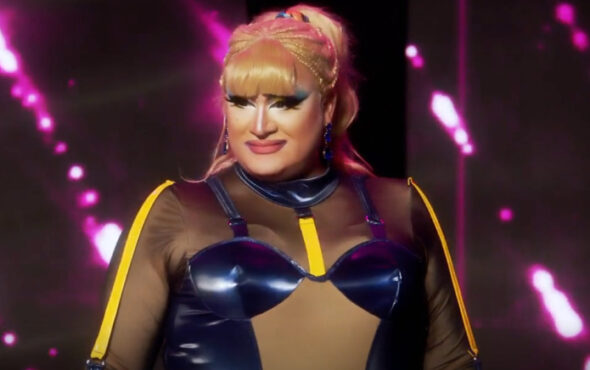
By the time our camera snaps Marie Ulven for the last time, she’s been in photo shoots for seven straight hours.
By her own admission, she’s feeling the toll of weeks of touring and press interactions, although she remains engaged and optimistic. At just 20 years old – and barely two years into her career – the indie pop artist known to fans as Girl In Red has completed a tour of the United States and Europe, and achieved millions of streams with her music. Even more impressive, all of this has been achieved without the backing of a record label. When I speak to Marie a week later, she’s had some time to reflect on the experience of her first cover shoot, which kick starts a promising new year for the Norwegian singer-songwriter.
“When you met me, I’d just been travelling for a month on the road, and it’s like squeezing the last juice out of a lemon. I was extremely drained and really tired,” she says. “And nobody can know what touring is like if you haven’t done it yourself.” As well as being down-to-earth and undemanding on set – she even insisted on bringing her own clothes – Marie is also refreshingly unfiltered when talking about life and her career; she lacks the rigorous PR training that so many A-list celebrities go through to present a picture-perfect image of themselves.
“It can get kinda draining,” she says of the promotional wheel. “You have to be like, ‘Hey, hey, hey!’ to everyone you meet, because you don’t want to come across as a dick, you don’t wanna be rude.” Her biggest fear, she says, is that people will perceive her as a diva – which of course couldn’t be further from her naturally grounded persona. Marie is the kind of person you’d want to head down the pub with on a Sunday afternoon. “But also, it’s not really natural to be so positive to so many people for seven hours straight either,” she stresses. “I don’t know. I’m just very human. But I’m trying to have a mentality to be grateful and try and stay positive because at the end of the day, it’s like any job, some parts are more boring than others.”

Her experience of fame – which she admits is “pretty small scale” compared to others – has given her a new outlook on more glossy, mainstream singers. “I’m thinking about really big pop artists who have been doing this since they were like 12 years old, people like Justin Bieber and Ariana Grande and Shawn Mendes. Maybe five years ago I would’ve been like, ‘Oh, you’re not edgy, you don’t play guitar, blah blah blah’, but now it’s like, they’re so professional, and I admire all of those people. I’m growing more and more fans of them every day.”
It’s this relatability that has won her a legion of loyal fans, who understand the brutally honest lyrics she pens. “Accepting I’m pointless isn’t the hardest, when it’s so completely obvious,” she sings on I’ll Die Anyway, a track that questions the futility of life over head-bang-worthy production. “Pretty face with pretty bad dreams, no one knows I cry in my sleep, waking up feeling like shit, it’s a normal thing to feel like this,” she confesses on Summer Depression, a mellowed-out diary entry about the mental health issues she faces with the change of seasons. On recent track I Need To Be Alone, she despairs, “It’s getting harder to exist, I don’t want to feel like this.” Her songs are, in a way, the perfect antidote to the eternally-positive self-love anthems that have dominated the charts over the past year.
“I’ve never second guessed my honesty or what I should write about, but I definitely didn’t think people would like it as much as they did,” she explains. “In a weird way, I feel we need to see more sad moments, because most of what we see on Instagram is just people’s highlights, we just see people’s good sides all the time. And if you’re not a part of that and you’re at home feeling like shit, then I think it’s good to have someone you can listen to and realise, ‘Okay, I’m not alone feeling this way or that way’. You never see when people are sad or not at the beach or at a party – and most of the time nobody is doing all those things, they’re just doing normal things in normal places, but you don’t see that so you don’t feel that way.”

Also key to Marie’s success is her honesty about her sexuality. Amid fierce debate over whether queer artists have a responsibility to use same-sex pronouns in their lyrics, the tender We Fell In Love In October sees Marie cry, “My girl, my girl, my girl, you will be my world,” over and over, ensuring there’s no doubt about where her attractions lie. On fan favourite Girls, she addresses the conflict she once felt about her growing attraction towards other women. “I should be into this guy, but it’s just a waste of time, he’s really not my type,” she sings, before admitting, “They’re so pretty it hurts, I’m not talking ‘bout boys, I’m talking ‘bout girls.” I Wanna Be Your Girlfriend even name-drops an unrequited love called Hannah. When it comes to visibility, Marie has got it down.
“I think having all this queer art and music and movies and photography and paintings, it’s so important and all that shit is gonna help this world move towards a better place,” she says. On set, the speaker blasts almost exclusively queer women; artists like The Japanese House, King Princess, MUNA, Brooke Candy, Tove Lo and L Devine – mostly at the request of Marie. We agree that, even five years ago, having such a wide array of out and proud female artists to listen to would be unthinkable. “Seeing all these girls and boys making them gay tunes, I’m just like, ‘Yaaas!’” she laughs. “It’s all moving in the right direction, and I feel like more and more people are going to come out – or maybe they won’t need to come out, they’ll just be themselves from day one, you know? That’s the ideal situation, they’ll just meet someone and they won’t care about gender or anything, because that doesn’t mean anything. What matters is that people are happy.”
Marie began writing music when she got her first guitar at the age of 13. She admits she was “the worst guitar player ever” at the start, but years of practice paid off. At the time, she was listening to Taylor Swift, Justin Bieber and One Direction – like most teenagers her age – but after an eye-opening viewing of The Perks Of Being A Wallflower she began exploring indie bands like The Smiths, New Order and Galaxie 500. All of these artists helped influence her current sound. “I like pop music, but it doesn’t feel like me. I could probably write one of those songs, but that doesn’t feel as honest,” she says. It wasn’t until a year ago, when people started listening to her songs online and her fan base grew, that she realised she had a real talent for making music. Even now, though, she second-guesses her success at times. “Sometimes I’ll think, ‘What do they see in me?’ I question it and I feel very doubtful and scared, but then other times I’ll be like, ‘Fuck yeah, this is the best shit ever!’ I feel like we could all be really good friends if I wasn’t living in Oslo. Most people are in the United States, but there are even people in, like, Saudi Arabia and shit. They’re everywhere. It’s awesome.”

The emergence of streaming and social media has opened up a world of possibilities for young independent artists like Marie. Where the prospect of creating and releasing music was once reserved for those signed to labels, anyone with the talent and ambition can now teach themselves to produce and record from their own bedroom. This has been especially significant for emerging queer artists, who may not get the same support from traditional entry routes into the industry as their straight, cisgender counterparts. “I’ve said this before, but I do feel like the music industry is way more democratic right now, because a lot more people have voices instead of just the dictators of the major labels handing out record deals,” she tells me. “You don’t need to go that way anymore.” Marie releases music under her own label called World In Red with the help of AWAL (Artists Without A Label), a new way of distributing that’s becoming increasingly popular among artists including Kim Petras, Allie X and Rex Orange County. “I just make all my tunes in my room, I think it’s awesome, and other people are making tunes in their room too, like Billie Eilish and FINNEAS. It shows that ‘bedroom music’ isn’t something that has to be small, it doesn’t need to be indie, it can be anything.”
Being independent also means Marie can write about whatever she wants, and not worry about dulling her queerness. “I don’t have to show my songs to anyone, I don’t have someone on the sidelines saying, ‘Oh, this is sad and gay, we need a hit’. I don’t have anyone defining me,” she explains. There have been talks with record labels, but they’ve left a slightly bitter taste in her mouth. “I did label meetings last year before I even had a manager, but they were telling me what I was, they were like, ‘You’re a songwriter to us, we just see you as a songwriter’, and they had never seen me perform or anything. So being independent is great. I don’t have anyone telling me what to do, or how to be, or to wear a fucking dress. I’ll wear a fucking suit if I want to, bitch!” Still, the prospect of writing a number one single isn’t totally out of the question for Marie. “I mean, I think all my songs are hits,” she laughs. “Okay, I need to calm the fuck down now – no, I don’t think all my songs are hits, but yeah, that’s obviously something that’s cool in any artist’s career, and I do want to write a hit on my own terms, but I don’t think that’s the goal. I think the goal is to always make sure every song I put out there is good. Do you know The Japanese House? I love all her music. None of it is a chart-topping hit, but it’s all good, and I feel like I’d rather do that and have a really, really good discography than to just have hits.”
A recent study found that Norway is the safest place in the world to be LGBTQ, and the country consistently ranks as one of the friendliest places to visit for queer people. I ask if Marie’s experience matches up, and for the most part it does. She recalls the only time she ever faced overt homophobia. “I was with my ex-girlfriend and we were just laying in a park together, we probably kissed, and this kid saw us and he was riding his bike around us going, ‘That’s wrong, that’s gross’, and I got really angry. I’m the kind of person who might hit someone if I get really angry. Obviously I don’t get that angry – and I wouldn’t punch a kid, obviously,” she laughs. “It is really good being gay here. Just like in any country, when you get out of the cities and into the more religious parts, there’s homophobia. Like, there’s this whole thing going on right now about conversion ‘therapy’ because that’s still going on, but now they’re talking about banning it. So it’s good for me, but it’s not good for everyone, and that’s not enough.”

After putting two beloved EPs into the world, Marie’s discography remains all killer, no filler. But for many, the true test of an artist’s worth is the ability to create a fully-formed album with a concept, a sound, a theme – something that’s become less common in the age of streaming. “I think albums still have a lot of value to them,” she agrees, confirming a full-length record is in the works. “Right now, I’m at home, and right after this interview I’m gonna make music, and I’m gonna do that every single day until I make a bomb-ass album and I’m gonna be like, ‘Fuck yeah, I made this shit’, then I’m gonna put it out, and it might flop, who knows? But then I’ll be putting out them singles to stimulate the streaming services and all the algorithms. So that’s what I’m gonna do.” Does she have any other plans for the future? “I’m just gonna make music, play some sick-ass festivals, and just have fun. Oh, and read some books! I wanna get better at that shit. Maybe I’ll start working out. I have a membership, I’ve paid like €700 for a year at the gym and I still haven’t gone there once, so let’s start working out.”
I suggest a New Year’s resolution, but Marie’s quick to offer some advice right back. “Fuck New Year’s resolutions, man! We can’t wait, you know? We might get hit by a bus tomorrow! We can’t wait. Nothing is guaranteed,” she says. “The only thing that’s guaranteed in life is death. So let’s go.”
Photography Hanifah Mohammad
Words Daniel Megarry



